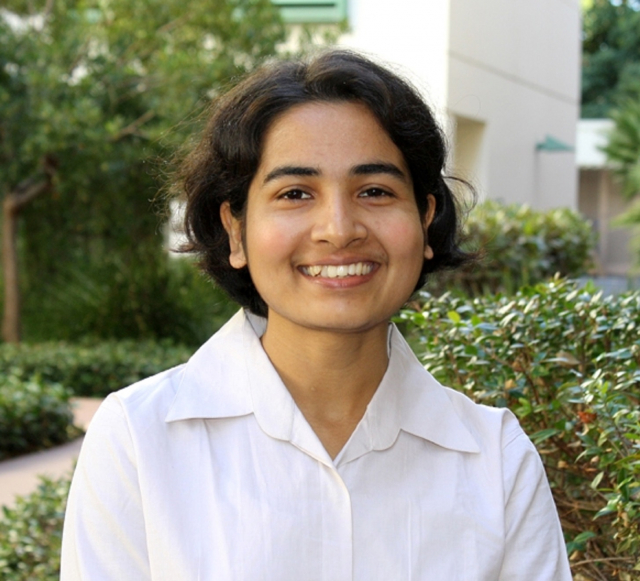Deblina Sarkar Named Winner of IEEE Electron Devices Society's 2011 PhD Fellowship Award
Electrical and Computer Engineering doctoral student Deblina Sarkar honored as the only researcher from the Americas and first UCSB nominee to receive 2011 IEEE Electron Devices Society’s PhD fellowship award.

UC Santa Barbara student Deblina Sarkar has been honored with a 2011 IEEE Electron Devices Society PhD Student Fellowship Award from the IEEE for her research exploring novel techniques for improving the energy efficiency and performance of next-generation nano-devices, bestowing UCSB with the first such recognition from the IEEE.
Each year the Electron Devices Society (EDS) of the IEEE awards three fellowships worldwide to students pursuing their doctoral degree in any area of interest to the EDS that includes all aspects of engineering, physics, theory, experiment and simulation of electron and ion devices involving insulators, metals, organic materials, plasmas, semiconductors, quantum-effect materials, vacuum, and emerging materials.
“We are proud that Deblina Sarkar has won the prestigious Fellowship Award from the IEEE Electron Devices Society,” commented UCSB Chancellor Henry Yang. “Being the first from UC Santa Barbara and the only PhD student from the Americas is such a distinctive honor.”
Ms. Sarkar joined the UCSB Nanoelectronics Research Lab of Professor Kaustav Banerjee in 2008 as a dual M.S./Ph.D. student upon completing her B.Tech. degree in electronics engineering from Indian School of Mines University (ISMU), Dhanbad, India, in 2008. Banerjee is well known as a thought leader in the field of nanoelectronics research and his technical ideas and innovations have been recognized internationally with numerous awards and honors.
While completing her Master’s degree at UCSB, Sarkar worked on the applicability of graphene – a material made of single layer of carbon atoms – as a promising interconnect material for transmitting high-frequency electrical signals to and from billions of transistors on a microchip. She also researched the design of graphene-based super energy-efficient electronic devices such as inductors, which are used extensively in all radio-frequency and analog/mixed-signal microchips.
“Deblina’s doctoral research is focused on tunnel-field-effect transistor, which is perhaps one of the most promising devices that can potentially replace MOSFETs and lead to unprecedented energy-efficiency in future generations of integrated circuits and systems,” said Kaustav Banerjee, professor of Electrical and Computer Engineering and Director of the Nanoelectronics Research Lab at UCSB. “There are certainly some severe challenges but Deblina has the intellect, energy, and drive to succeed.”
The basis for judging for these awards is demonstration of significant ability to perform independent research in the fields of electron devices and a proven history of academic excellence. The award comes with a cash prize of US$5,000 and a recognition plaque to be awarded at the International Electron Devices Meeting (IEDM), the world’s pre-eminent forum for reporting technological breakthroughs in the areas of semiconductor and electronic device technology, design, manufacturing, physics, and modeling. Ms. Sarkar will be traveling to Washington D.C. in early December to attend the award presentation ceremony.
“This is indeed an honor for Professor Banerjee’s group and for UCSB,” said Larry Coldren, Professor of Optoelectronics and Photonics at UCSB and Director of the Optoelectronics Technology Center.
“The research environment in our group has always been very stimulating and this award is definitely an encouragement for me to work even harder,” said Ms. Sarkar. “I would like to thank my advisor, Professor Banerjee, and my parents for their continuous support and inspiration.”
The Electron Devices Society (EDS) is a technical society of the IEEE with more than 11,000 members worldwide, distributed in over 145 chapters on six continents, that aims to promote excellence in the field of electron devices for the benefit of humanity. Their mission is to foster professional growth of its members by satisfying their needs for easy access to and exchange of technical information, publishing, education, and technical recognition and enhancing public visibility in the field of Electron Devices. The EDS Newsletter will feature articles about Ms. Sarkar and her work over the course of the next year.